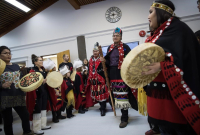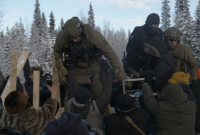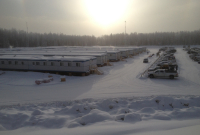Support strong Canadian climate journalism for 2025
Colourful pictographs decorate several rocks that curve slightly over the waters of Stuart Lake in central interior British Columbia. The primordial drawings were made by the ancestors of the Dakelh-speaking First Nations and Nak’azdli Whut’en, who live at the southeast end of the lake.
The Nak’azdli roots are deep and date back 10,000 years. It is a home they’ve fiercely protected from enemy takeovers in the past. Revered Chief Kw’eh, ‘Dreamer of the salmon,’ was buried at the mouth of the Stuart River in 1840.
He once avenged the murders of most of his family during an enemy raid with a bloody counter attack, but became known as an inter-tribal conciliator and is regarded as a person of national historical significance for his leadership.
The overflowing salmon dams of the Stuart River fed Chief Kw’eh’s people in his time and for thousands of years prior.
Today, the salmon that return here each spring are in rapid decline.
“Our livelihood is our salmon,” the current elected Nak’azdli Chief Alexander McKinnon said in an interview with National Observer. “The oil line was going to go right through Stuart River.”
The oil line was the Enbridge Northern Gateway project proposal that was shut down by the federal government in 2016, partly from pressure by opponents among the Nak’azdli tribe, the Nadleh Whut’en First Nation and the bordering town of Fort St. James.
“Nakazdli and Nadleh killed Enbridge,” McKinnon said. “We filed an injunction against the Enbridge oil pipeline. We knew this was an act of war on us. No matter what, we need to defend (our salmon, waters and land). We will go to war. It would've been an Oka showdown in B.C.”
Northern Gateway would have provided crude oil transport from Alberta’s oilpatch through the Great Bear Rainforest to Kitimat, B.C. It was opposed by dozens of First Nations along the proposed line and dozens more defending the mighty Fraser River from potential threat.
No sooner than Northern Gateway was cancelled than developers for liquid natural gas (LNG) project proposals were on the scene.
It would lead McKinnon to have to make one of the most difficult decisions of his life.

McKinnon is a father of five, and along with his wife, fosters his niece’s young son in their humble, but up-to-date manufactured home on the reserve. He is a hunter, fisherman and was raised to know the ways of the Keyoh (territory). He is also a member of the Beaver clan, who are warriors and protectors, he explained.
“We are not oil and gas people. When the LNG boom hit in 2014 there were about seven companies that approached us (with developments). It wasn't a negotiating process. They were trying to impose agreements on us. So we said, ‘Woah, we need to get up to speed on what this is,’” he said.
Pressure from province and Coastal GasLink
The pressure was on from the B.C. provincial government and TransCanada’s Coastal GasLink’s LNG pipeline project to transport natural gas across northern B.C. to a liquefied natural gas terminal in Kitimat. The proposal included pipeline construction on parts of Nakazdli’s 25,000 square kilometres of unceded traditional territory, including under and over vulnerable waterways that sustain salmon, wildlife and human drinking water.
About 700 of some 2,000 members of the Nakazdli First Nation live on a reserve located 160 kilometres northwest of Prince George, B.C. and bordering the town of Fort St. James.
Band members, who are eligible to vote whether or not they live on reserve, voted in 2015 against allowing Coastal GasLink in. But the company, backed by the B.C. government, came back and asked for another vote by the elected chief and council. When that ended in a tie, the fate of the pipeline in Nakazdli territory was up to McKinnon.
“They were going to build it one way or another,” McKinnon said with a long sigh. “In order for us to ensure that we were ensuring our salmon were protected and the environment was protected, we needed to make sure that we were sitting at the table.”
He gave the final go ahead and signed a Mutual Benefits Agreement (MBA) on behalf of the Nakazdli Whu’ten with Coastal GasLink.
It was a really hard decision.
“To the 11th hour ... I was on the phone constantly with Coastal GasLink on how we were going to get our concerns answered. Every decision we make today is going to affect the generations to follow. It’s not just seven generations, it’s multi generations. I pushed hard, many late-night phone calls,” he said.

He said he voted in favour because the pipeline wasn’t going to be carrying crude oil like the Enbridge proposal, but liquified natural gas, which McKinnon believes is less dangerous. And there were stipulations that no oil would ever be carried through the pipeline; and that the company would never attempt to pipe out freshwater from Stuart Lake.
As an extra safety net a few band members were trained to monitor construction of the pipeline in their territory. Pre-construction is already underway with construction set to begin there this summer.
“I have trust issues and TransCanada/industry/the province knows this,” McKinnon said. “Look at what they’ve done to us over 150 years. If they think we’re going to say ‘yes we’re buddies again,’ no, they’re going to have to prove trust and relationship. And why give the benefit of the doubt to the province? They’ve put us in poverty and never really gave two shakes about us, about anything until now, when they need the social license. That's why we got the monitors, our own working group of people that’s going to oversee their work.”
The Nakazdli is one of 20 bands along the pipeline route whose elected leadership has signed an MBA. While MBAs have been touted by Coastal GasLink as having “incredible support” from First Nations, the Nakazdli path to one was rocky.
It took six years, long hours of meetings, emails and telephone calls of negotiations between Coastal GasLink and the Nakazdli elected leadership to come to an agreement. Pleas from the Nakazdli for Coastal GasLink to consider traditional knowledge during construction through its already vulnerable territories, social impacts and economic benefits were all put on the table.
Rick Gateman, president of the Coastal GasLink pipeline project, said in a press release in September 2018 that the company’s goal was to build more than “just relationships” with First Nations in B.C. “It was to build trusted partnerships, and that has made all the difference,” he said.
In addition to the MBAs, Coastal GasLink has allocated approximately $620 million in conditional contracting and employment opportunities to northern B.C. Indigenous businesses. Another $400 million is projected for contracting opportunities for Indigenous businesses during the construction phase.
Economic benefits should be plentiful
The MBA will help provide resources for programs such as language revitalization and infrastructure improvements, but the Nakazdli are already doing well on their own, financially. Nakazdli own two gas stations, a grocery store, logging company, trucking company and recently invested in a state-of-the-art greenhouse to grow and distribute leafy greens.
The band’s healthcare center has its own doctor that sees patients three days a week, saving them the hour and a half trek to Prince George.

The pipeline will bring more jobs and contracts. The Nakazdli is a LNG Coastal GasLink construction partner and has partnered with an aviation company specifically to navigate the LNG construction.
“The opportunities are endless. I asked TransCanada what their pecking order was (with jobs) they told me, hopefully First Nations, then British Columbians, Canada and then the rest of the world. I told them I will hold them to that order,” said McKinnon.
Like many First Nations, Nakazdli struggles with deeply embedded social issues stemming from colonization and the intergenerational effects of residential schools and the sixties scoop. Addictions, depression and unemployment rates are higher here because of dispossession and disconnection to the lands, culture and traditions, said McKinnon. However, the community is on a healing journey and reconnecting to traditional territory is a key aspect.

Protecting women and girls a high priority
But additional threats linger to women and children because of the man camps that are slated to house thousands of mostly male workers to build the pipeline across Northern B.C.
Rosemarie Sam, a Nakazdli member who lives on the reserve, won’t travel alone on the main Highway 16 to get to Prince George. It’s known as the Highway of Tears where dozens of mostly Indigenous women have gone missing or been found dead. With industry bringing in thousands of workers, she believes the women are at an even greater risk for harm.
As she holds her wide-eyed, curious, one-year-old son Gabriel, she softly says she wished Coastal GasLink and the province had paid more attention to social and cultural impacts.
“It’s hard because we’re still rebuilding, revitalizing our culture and languages so we’re at risk and vulnerable already,” said Sam.
“A lot of times these projects are sold in our communities as being saviours. We’re told we’re being ridiculous for our concerns. Or that it’s unreasonable to ask about the cultural/social impacts.”

She also works for the band’s natural resources office and deals directly with LNG on a regular basis. Coastal GasLink staff treat her respectfully now, she says, and she’s thankful to be able to directly monitor construction in Nakazdli traditional territories alongside her colleagues.
But still, it doesn’t make her feel any safer to travel the roads alone.
For McKinnon, it’s a high priority to ensure the protection of women and girls, especially given that the Fort St. James hospital began stocking rape kits in the last couple of years.
“We told them (industry) we need to ensure we have policies in place that are going to protect our women and children and our vulnerable,” said McKinnon. “We didn't have to deal with this prior to contact. Our women were held on a pedestal, they’re the givers of life. It’s our responsibility. ...This is not behind closed doors anymore. It’s our problem. We’re going to talk about it, it will be a norm to have these difficult discussions. We’re going to give the training to camp workers. We need to ensure these camps are going to implement this policy.”
Hereditary chief says nobody will 'push us around'
Ultimately, the Nakazdli are not anti-industry, he added. They want to participate in all levels of development, from planning to construction and maintenance. That includes relationship building, reconciliation and sharing Indigenous perspectives every step of the way.
Soon, more industrial developments will come knocking; more gold deposits were recently discovered at a nearby mountain in Nakazdli territory. McKinnon said elders from the west in oil booming Alberta once prophesied that Nakazdli and other First Nations were next. Industry was coming for them too. And the Nakazdli are preparing for what may lay ahead.
“It’s not an option anymore. If you’re going to work within Nakazdli territory you’re going to learn about who we are. They (industry) will show more respect,” explained McKinnon. “They can understand why we fight so hard to protect what we have, why we dig in. Just throwing money at us is not going to work. They think money solves all problems- it’s not going to happen.”
Still, the Nakazdli do not yet have a Provincial Benefit Agreement (PBA) in place with the B.C. government on the Coastal GasLink project. A PBA stipulates financial sharing benefits from the project between the province and the Nakazdli. Along with initial financial payouts to the bands along the route, the province distributes benefits throughout the lifetime of the project.
McKinnon said the band does not want the province involved in its negotiations with industry and wants the province to address issues such as Treaty negotiations before signing new agreements with it. The CGL pipeline project is cleared to begin construction in Nakazdli territory meantime because of the company’s MBA.
"When the community has completed their ratification, we will ensure the Province’s obligations to provide benefits from the agreement are appropriately fulfilled," a provincial government spokesperson said. "The Province respects that each community needs to undertake the appropriate engagement with their elected and hereditary representatives and their broader membership before they bring these agreements into effect."
Nakazdli Hereditary Chief Peter Erickson, also of the Beaver Clan, said Coastal GasLink and the province only ever had one intent: to pressure the band to consent.
“They had our chief and council up against the wall and said, ‘you will get nothing and we’re going to put that pipeline through anyway,’” he explained. “They had no intent of listening to us.”

Opponents said the project was a potential threat to the environment. The stocks of salmon that run through the Stuart and Salmon rivers in their territory are almost gone.
“We are the only people that are allowed to fish them. Our moose populations are at 50 per cent and caribou are at zero,” said Erickson.
He’s employed by the band’s natural resources office and regularly patrols Nakazdli traditional territories, traveling up and down industrial logging roads which have been there for decades. He’s out there making sure that trees are properly replanted and not wastefully uprooted for the LNG pipeline if they’re still too young. They’ve already been disturbed by the logging industry, affecting all creatures who call the forest home.
He uses traditional knowledge of the land to take care of it, unlike industry which doesn’t know or care about the land, he explained. He’s worried about Salmon River which is deep in the bush near a logging road where the LNG will cross. It’s a sacred place for the Nakazdli whose ancestors have fished and navigated the waters and where ancient footpaths are still visible along the forest bed.

Erickson said his role as a hereditary chief is to move the community forward, but not all in the name of economics, which is a popular anthem in mainstream society.
“For us, it’s not how much gold you can stack up in the center of the room. It’s how much gold your entire community gets...None of the negotiations with LNG were on becoming true partners, so, we don’t share in that,” he said. “They can blow that out their butts.”
'We're not afraid of court'
He takes his role as a hereditary chief seriously, and band members regard hereditary leadership as above the elected 'Indian Act' chiefs.
However, he is not bitter towards McKinnon, whose shoulders the final decision about LNG rested on. They both belong to the Beaver clan and respect one another. And Erickson is all too familiar with conquer and divide tactics of colonialism that oppress many First Nations. He refuses to let such tactics sway him.
Erickson and other community members are working to form a legal organization to enshrine and recognize traditional leadership.
“We will start to enforce those roles within the legal framework. We will challenge people one by one for every tree in our territory, every fish in our territory,” said Erickson. “If anyone wants to push us around currently, they just call the RCMP and put us in jail. But now we’re going to have a legal organization saying, no, we’ve made a decision, if you want to dispute that decision then let's go to court. We’re not afraid of court.”

Editor's note: This article was updated to correct a photo caption. Nurse Renada Walstrom was taking April Rivard's blood pressure in the photo taken at the health centre.
This article is one in a series of stories by reporter Brandi Morin from four of the 20 First Nation communities with agreements allowing the Coastal GasLink pipeline and liquefied natural gas project on their territory.






Comments
Very informative article. But a few places the GCL pipeline called the 'LNG' pipeline. I assume it is just a simple way to express it. It is actually a natural gas pipeline at this stage, the gas will have to get to the plant in Kitimat before it is turned into LNG. The Nakazdli territory, and other territories along the GCL will be influenced by the pipeline, pipe hauling trucks, man camps etc. But there will be big fracking impacts to produce the natural gas, Blueberry River, Fort Nelson and other FN in the NE of B.C. Their land and water and forests has already been greatly impacted and degraded, but will be impacted even more than it is now when (if) the LNG goes through.